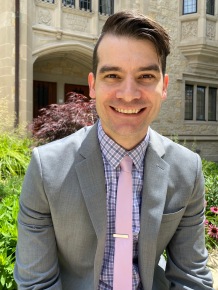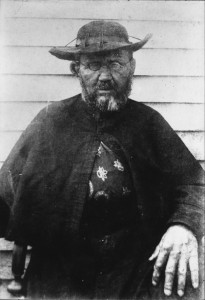As a first-generation college student from northeast Missouri, I completed a BA in Philosophy and Religion from Truman State University in Kirksville, MO. My initial plan had been to major in English (I was and still am infatuated with Walt Whitman’s poetry) and pursue a career as a high school teacher but a study abroad trip to the Middle East vividly impressed upon me the complexity and importance of religion.

After completing a master’s degree at the University of Chicago Divinity School, I transitioned into the doctoral program. From the beginning, my research has been oriented around the study of leprosy, or Hansen’s disease. I’m fascinated by the veritable obsession with this disease displayed by Christianity over the centuries: from contradictory Biblical passages (Miriam, Leviticus, Naaman, Lazarus, etc.) to leprosy’s prevalence in the Lives of the Saints. Our own country has a little-known, tragic history with leprosy in that thousands of sufferers of the disease were the victims of legalized, mandatory quarantine. Owing more to fear and misunderstanding (not to mention xenophobia) than accurate medical knowledge, leprosy sufferers were expelled to Molokai, Hawaii or Carville, Louisiana until the late 1960’s. There were also similar settlements at Culion in the Philippines, as well as Puerto Rico and the Virgin Islands. I am interested in what I see as the ongoing critical relevance of leprosy and its religiously inflected, historical tradition to how contemporary communities (especially religious ones) respond to stigmatic illness, e.g., HIV/AIDS, mental illness, neglected tropical diseases, even mpox.
Understandably, I think and teach across the traditional disciplinary boundaries of biomedical ethics, the history of medicine, religious studies, and even Indigenous studies. Historically, especially where leprosy was concerned, there was little separation between theological assumptions, religious practice, and public health paradigms. My work proposes a methodological marriage between these fields as a corrective in order to present a more nuanced profile of how unique diseases like leprosy have reconfigured diverse bodies of knowledge and regimes of power throughout history. This is ultimately to better inform how bioethics (and our public health apparatus) responds to and addresses contemporary stigmatic illness.

Father Damien of Molokai, taken shortly before his death
I have been intentional to find more practical outlets for some of my academic interests. In Chicago, this included being the inaugural “wellness chair” for the Divinity School Student Association where I worked to raise awareness around and promote mental health and wellness at the Divinity School. I was also the Divinity School Representative to the University of Chicago Student Health Advisory Board for five years, collaborating with various campus stakeholders to improve quality of and access to healthcare. I’m thrilled to now be at an institution like Des Moines University where there’s a profound commitment to wellness and addressing stigmatization within healthcare. But when I’m not occupying a disproportionate amount of my time thinking and talking about leprosy or ethics, I enjoy spending time with my family or my Miniature Schnauzer, Finnegan, as we explore the Des Moines area.
Featured image: Fountain and Pickler Memorial Library (Truman State University)
Home page image: Notation made by Father Damien in his Diagnostic Record notebook alongside notes about remedies for various ailments on Molokai (taken by author)
